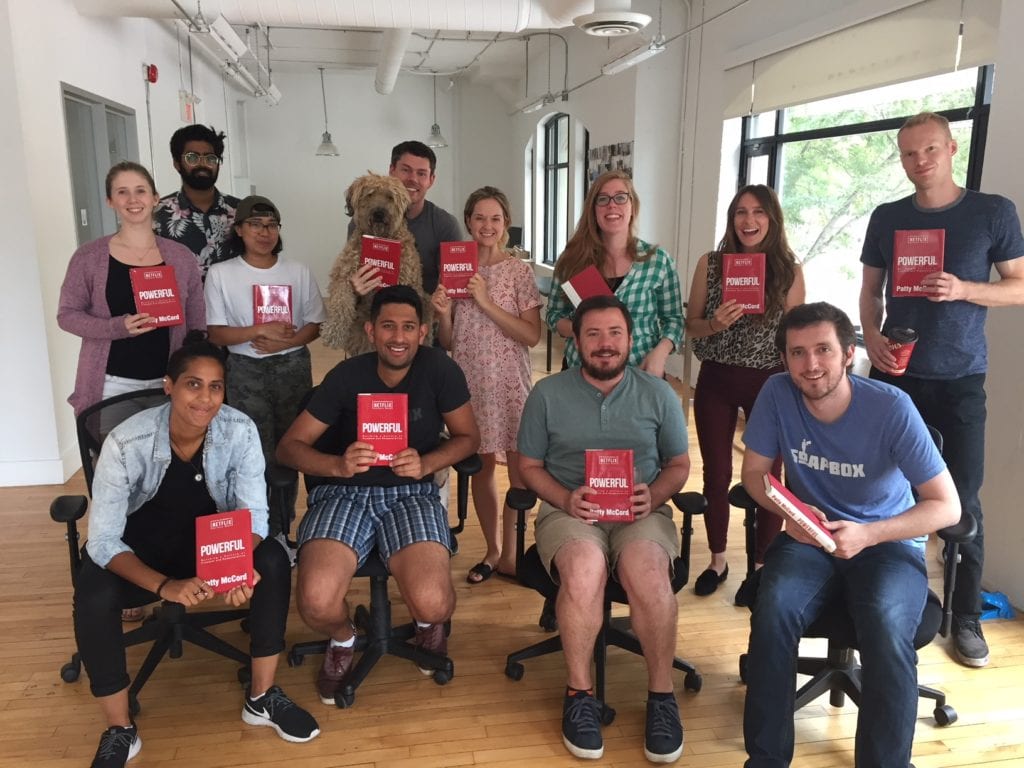SoapBox Book Club: Powerful (including a Q&A with author Patty McCord!)
This month, the SoapBox book club is talking about Powerful: building a culture of freedom and responsibility. This is an…
This month, the SoapBox book club is talking about Powerful: building a culture of freedom and responsibility. This is an extra-special book club, as we were able to sit down with author (and Netflix’s former Chief Talent Officer) Patty McCord and ask her a few questions! So be sure to keep reading to the end for the author Q&A. 📚
Let’s dive in!
The basics
Length: 152 pages
Read time: 2 to 3 days
Where to get it: Patty’s website
Type of book: Company culture, employee engagement, management
Recommended reading for: HR professionals and startups looking to be like Netflix
About the book
Powerful is an in-depth look at how Netflix created and fostered its unique (and, at times, highly experimental) company culture. As told by the company’s former Chief Talent Officer Patty McCord, it reads as a kind of companion piece to the famous Culture Deck she helped to create. Think of the book as 25% behind-the-scenes Netflix history, and 75% management and HR advice.
It’s a relatively fast read, with “In brief” bullets at the end of each chapter accompanied by questions to ask yourself (or, in our case, the book club as a whole!).
Who is Patty McCord anyway?
Patty was Netflix’s Chief Talent Officer for 14 years. Before that, she worked with Sun Microsystems, Borland and Seagate Technology, and her experience with these companies informed her experimental approach to HR and employee engagement at Netflix. She’s now a speaker and culture and leadership consultant, working with a range of startups and enterprise companies.
The chapter we couldn’t stop talking about: “Every single employee should understand the business”

Chapter two really resonated with the team – and it’s no surprise. The emphasis on constant communication flowing up and down hits home for us here at SoapBox, a company founded on the idea of continual feedback and involvement.
The last section in particular really got us talking. Patty suggests the best indicator that your team is well informed is that you can stop any employee and ask them to list the five most important things the company is working on for the next six months. If anyone you stop can tell you, rapid fire, those five things, you have a well-informed team.
That led us to go around the group and identify areas of the company we each want to learn more about – a great exercise for identifying any blind spots in your company communication.
Our top 3 quotes 👏
“Don’t hire people who are stupid. Better yet, don’t assume people are stupid. Assume that if they are doing stupid things, they are either uninformed or misinformed.”
“There’s a dangerous fallacy that data constitutes the facts you need to run your business. Hard data is absolutely vital, of course, but you also need qualitative insight and well-formulated opinions, and you need your team to debate those insights and opinions openly and with gusto.”
“The measure should be not simply how many people you are keeping but how many great people you have with the skills and experience you need.”
Q&A with Patty McCord
SoapBox: Why did you write Powerful?

Patty McCord: After I left Netflix, I started doing some consulting. I got introduced to a lot of companies, a lot of startups, and they would take the Netflix Culture Deck that they printed off the web, and they would throw it down on the table and say “We want to do this!” And I would say, “Well, it took 10 years to write that.”
So I wrote this book. I sometimes call it “The Hitchhiker’s Guide to the Netflix Culture Deck.” This isn’t just this isn’t just a series of ideas – it’s a whole set of behaviours that you can keep adding to. And then pretty soon, you have a really different kind of culture. Well, not pretty soon – over a number of years.
What’s your favourite chapter?
It’s like asking me a favorite child! But I like five and six, because they’re very practical recruiting advice. That’s my background and I think that having the right talent and the right teams to do the work you need for the future is a really critical component to my philosophy about people.
You talk a lot about the importance of constant communication to keep teams informed. What tactics are best for nailing that constant communication?
Here’s how I think about communication: I call it sometimes the heartbeat of communication. The weekly check-in are really effective when you’re small, and you’re making stuff up and you’re doing a lot of work that’s just sort of slamming down ideas that don’t work. You know, in the beginning it’s a lot of failure.
Once you sort of can get something that where you can see success, then focus is really important. I call it, my methodology, I call it “Stand on a chair.” When you can no longer stand on a chair and everybody can hear you, it’s time to rethink your method of communication.
"When you can no longer stand on a chair and everybody can hear you, it's time to rethink your method of communication." – from @SoapBoxHQ's book club Q&A with @pattymccord1 Click To TweetYou talk about not being afraid of turnover at Netflix, and knowing when it’s time to let people go. How did you handle knowledge transfer with that turnover?
It will happen more naturally as you grow because complexity will force it.
I just talked to Reed, CEO of Netflix, and they use the system now where they have a Google Share doc system, where they take a particular business problem or issue, and whoever is the owner of the decision writes an explanation of problem, what they’re looking at, how they’re going to solve it, what their frame is…it’s basically a written description that anybody in the company can read and anybody in the company can have access to it.
They do look very big, very meaningful corporate directional decisions, and then everybody’s allowed to comment on that. And then when they have their in-person meetings, you come prepared with that information to discuss and debate. And so it allows a bigger group of people to have a lot of information.
As you scale, the last thing you want is to lose something because you lose a person. It’s much better to have all that knowledge shared. Because then you don’t panic. And you don’t keep somebody who’s unhappy because they’re the only one that knows something.
What’s one actionable tip for readers to take away?
That your career is your business. That it’s your job to look out for yourself, and to note when you’re happy and unhappy and make sure that you have a place with good lines of communication and honesty.
From the management side, it’s company first. You look out for your customers, and then you look out for your business, and then you make sure you got the right teams to do it. But that’s hard if you have a fundamental belief that you owe everybody lifetime employment.
When you’re small, there’s that sense of family. And that point of “we’ve created a wonderful company where everybody’s going to find total joy and happiness because I have.” And so for HR people and early-stage startup people, there’s a sense of “Our job is to create a place that’s so wonderful that we’ll be able to provide jobs and career paths and development for everybody going into the future.”
Then almost always when companies hit step functional change in either complexity or scale, then they suddenly realize, “Oh s***. These may not be the right people. Now what?” And then it’s really hard.

What you should do now
You made it to the end of this article! Here are some things you can do now:
- Check out our integrations page to see how Hypercontext works with your favorite team tools.
- Check out Hypercontext to see how it can help you run a high performing org.
- If you found this article helpful, please share it with others on Linkedin or X (Twitter)
In this post
In this post
